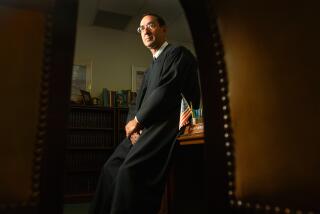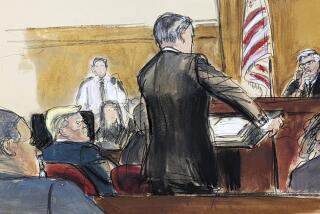Barring Reprieve, U.S. Judge Claiborne to Start Prison Term
- Share via
SAN FRANCISCO — Barring a last-minute reprieve, U.S. District Judge Harry Claiborne, the only federal jurist ever convicted of a felony committed while on the bench, will go to prison Friday for income tax violations.
Claiborne, 68, a vitriolic critic of the Justice Department, lost his appeal Tuesday for a delay in going to the Maxwell Air Force Base Federal Prison Camp in Alabama, where former Atty. Gen. John Mitchell and ex-White House aide Charles Colson served time for their Watergate convictions.
After an unusual hearing with telephone conferences among lawyers and judges in five cities, a three-judge panel of the U.S. 9th Circuit Court of Appeals denied a stay of the sentence.
Appointed by Carter
Claiborne, appointed to the U.S. District Court in Las Vegas by President Jimmy Carter, is the first sitting federal judge to be convicted of a felony committed while serving on the bench. He is scheduled to begin serving a two-year term Friday at the Alabama facility, frequently called the country club of federal prisons.
The government contended Claiborne had exhausted all his legal recourses. But his trial attorney, Oscar Goodman of Las Vegas, said he will fight to the end, indicating a possible appeal to the full 9th Circuit panel or to the U.S. Supreme Court.
When Claiborne was convicted in 1984 of filing a false income tax return, he renewed his long-standing claim that the Justice Department was conducting a vendetta against him because he had criticized the federal anti-crime task force in Las Vegas and called its agents “crooks and liars.”
Claiborne was originally charged with tax violations and with taking bribes from a former client. His first federal trial ended in a hung jury.
Tried on Tax Charges
The government then dropped the bribery charges and tried him on the tax allegations, saying he willfully failed to report income he had earned while in private practice and received while on the bench.
Terence Anderson, a University of Florida law professor who represented Claiborne in the appeal, argued that the sentence should be stayed until both the trial court and the 9th Circuit rule on several questions.
A key issue was whether a federal judge, appointed for life, can be imprisoned without having been impeached. The House Judiciary Committee is considering impeachment of Claiborne but has taken no action.
Jan Little, a Justice Department lawyer, argued that Claiborne “should not be immunized from the process of criminal law.” His imprisonment would not remove him from office, and his $78,700 salary would continue, she noted.
More to Read
Sign up for Essential California
The most important California stories and recommendations in your inbox every morning.
You may occasionally receive promotional content from the Los Angeles Times.












